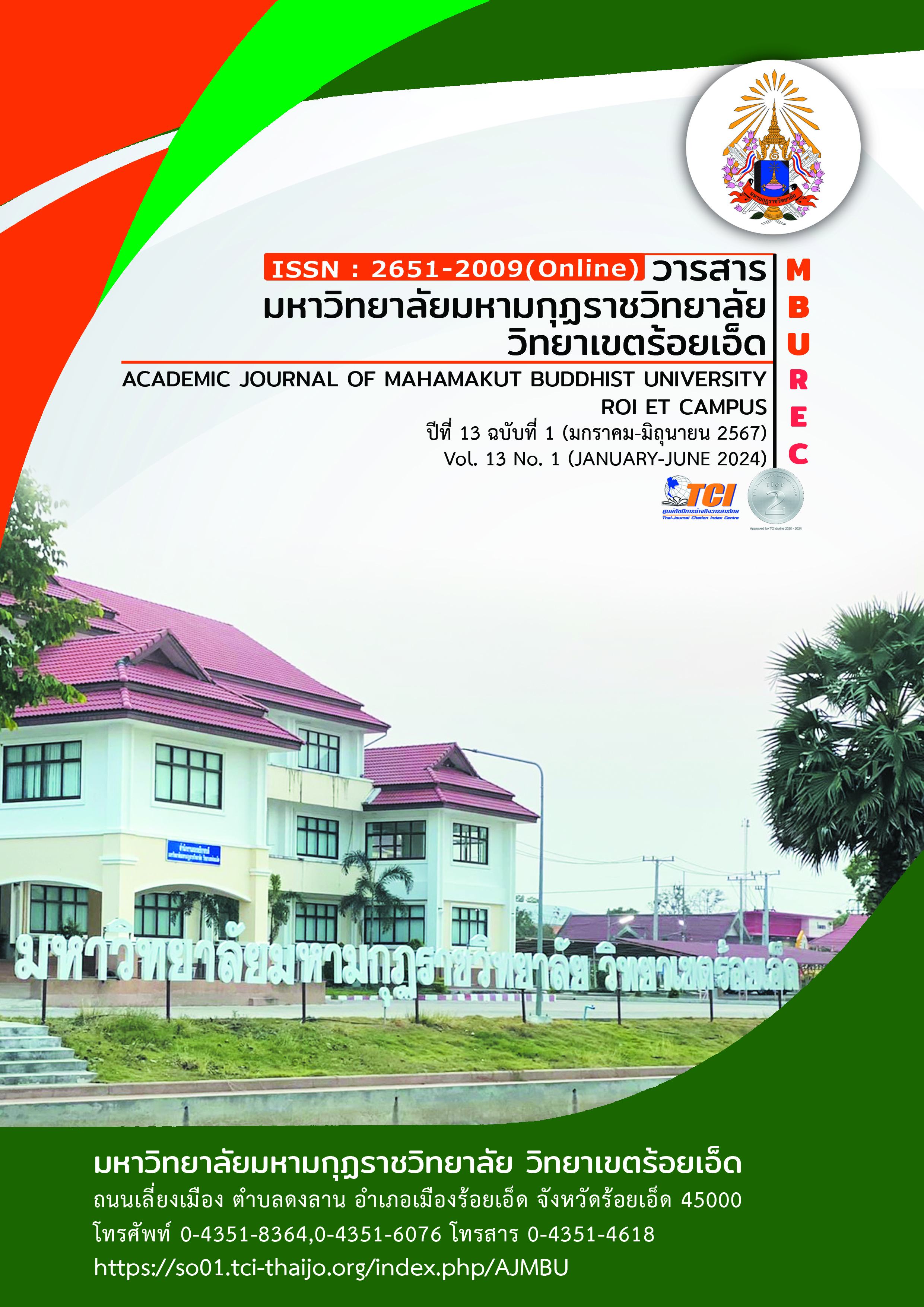PEOPLE’S ATTITUDES TOWARDS MANAGEMENT ACCORDING TO THE FOUR SUBLIME STATES OF MIND OF SANCHAT SUBDISTRICT ADMINISTRATIVE ORGANIZATION, CHANGHAN DISTRICT, ROI ET PROVINCE
Main Article Content
Abstract
The objectives of the research were 1) to study the level of People’s attitudes towards management according to the four Sublime States of mind of Sanchat Subdistrict Administrative Organization, Changhan District, Roi Et province. It is at a high level, both overall and individually, satisfaction is at a high level. 2) To compare People’s attitudes towards management according to the four Sublime States of mind of Sanchat Subdistrict Administrative Organization, Changhan District, Roi Et province. classified by village 3) To suggest People’s attitudes towards management according to the four Sublime States of mind of Sanchat Subdistrict Administrative Organization, Changhan District, Roi Et province. The sample group is the sample group, which is Saenchat Subdistrict Administrative Organization, Changhan District, Roi Et Province. A total of 9 villages were divided into administrative areas, with a random sample of 346 people. The data collection tool used a 5-level estimation scale questionnaire, the statistics used in the research, including frequency, percentage, mean, standard deviation, F-test, variance analysis, and comparison of differences between means.
The results showed that: 1) The level of People’s attitudes towards management according to the four Sublime States of mind of Sanchat Subdistrict Administrative Organization, Changhan District, Roi et province. It is at a high level, both overall and in each aspect. This may be because the Saenchat Subdistrict Administrative Organization has performed its operations based on the four Brahma Viharas, namely Metta, Kura, Mutita, and Upekkha, thus helping people in the area to be treated well. and satisfaction until the attitude is at a high level. 2) To compare People’s attitudes towards management according to the four Sublime States of mind of Sanchat Subdistrict Administrative Organization, Changhan District, Roi et province. classified by village, it was found that people living in different villages. The attitude of the people towards the management according to the Four Sublime States of Mind of Saenchart Sub-district Administration Organization, Changhan District, Roi Et Province, differed both overall and in each aspect, statistically significant at the level of 0.05. 3) To suggest People’s attitudes towards management according to the four Sublime States of mind of Sanchat Sub-district Administrative Organization, Changhan District, Roi et province. found that to suggest guidelines Management Planning Treatment of visitors to guide visitors with care to the public.
Article Details

This work is licensed under a Creative Commons Attribution-NonCommercial-NoDerivatives 4.0 International License.
References
จิระพงศ์ เรืองกุน. (2556). การเปลี่ยนแปลงองค์การ: แนวคิด กระบวนการ และบทบาทของ นัก บริหารทรัพยากรมนุษย์. วารสารปัญญาภิวัฒน์. 5(1). 194-203.
บุญชม ศรีสะอาด. (2545). การวิจัยเบื้องต้น. พิมพ์ครั้งที่ 7. กรุงเทพมหานคร : สำนักพิมพ์สุวีริยาสาสน์ จำกัด.
เบญจมาศ อยู่เป็นแก้ว. (2548). ความหมายการบูรณาการ. กรุงเทพมหานคร : โรงพิมพ์นิวัฒน์พร.
ประสิทธิชัย พิบูลรัตน์. (2552). อดีต ปัจจุบัน และอนาคตของ การจัดการความรู้. วารสารการเมือง
การบริหารและกฎหมาย. 1(1). 111-132.
พระธรรมปิฎก (ป.อ. ปยุตฺโต). (2544). ความหมายการบูรณาการ. กรุงเทพมหานคร : โรงพิมพ์ มหาจุฬาลงกรณ์ราชวิทยาลัย.
พระธรรมปิฎก (ป.อ. ปยุตฺโต). (2538). พุทธธรรม ฉบับปรับปรุงและขยายความ. กรุงเทพมหานคร : มหาจุฬาลงกรณราชวิทยาลัย.
พระพรหมคุณาภรณ์ (ป.อ. ปยุตฺโต). (2548). พจนานุกรมพุทธศาสตร์ ฉบับประมวลธรรม. พิมพ์ครั้งที่ 13.กรุงเทพมหานคร : บริษัท เอส.อาร์.พริ้นติ้ง แมส โปรดักส์ จำกัด.
พระพรหมคุณาภรณ์ (ป.อ.ปยุตฺโต). (2546). พจนานุกรมพุทธศาสตร์ ฉบับประมวลธรรม. กรุงเทพมหานคร : บริษัท สหธรรมิกจำกัด.
พระราชบัญญัติสภาตำบลและองค์การบริหารส่วนตำบล พ.ศ. 2537. (2537). ราชกิจจานุเบกษา. เล่มที่ 111. ตอนที่ 53 ก. หน้า 11.
พระราชวรมุนี. (2538). คุณธรรมของนักบริหาร. กรุงเทพมหานคร : มหาวิทยาลัยมหาจุฬาลงกรณราชวิทยาลัย.
พระวุฒิชัย วชิรเมธี (ว. วชิรเมธี). (2557). ทฤษฎีการบริหาร. พิมพ์ครั้งที่ 1. กรุงเทพมหานคร :
สถาบันวิมุตตยาลัย.
ไพศาล วรคำ. (2554). การวิจัยทางการศึกษา. พิมพ์ครั้งที่ 2. มหาสารคาม : ตักสิลาการพิมพ์.
รัฐธรรมนูญแห่งราชอาณาจักรไทย. (2550). ราชกิจจานุเบกษา. เล่มที่ 124 หน้า 1-127
ราชบัณฑิตยสถาน. ( 2555). พจนานุกรมศัพท์ศึกษาศาสตร์ ฉบับราชบัณฑิตยสถาน. กรุงเทพมหานคร : อรุณการพิมพ์.
ศตพล พนิชศักดิ์พัฒนา. (2559). ทัศนคติของประชาชนชาวจังหวัดสกลนครที่มีต่อการบริหารงานขององค์การบริหารส่วนจังหวังสกลนคร. วิทยานิพนธ์รัฐศาสตรมหาบัณฑิต.มหาวิทยาลัย เกริก.
สมคิด เลิศไพฑูรย์. การบริหารงานบุคคลส่วนท้องถิ่น. กรุงเทพมหานคร : การเมืองการปกครองท้องถิ่น.มหาวิทยาลัยธรรมศาสตร์.
สมนึก ภัททิยธนี. (2546). หาค่าเฉลี่ยเที่ยงตรงเชิงเนื้อหาให้คะแนนตามดัชนีความสอดคล้อง. ร้อยเอ็ด : มหาวิทยาลัยราชภัฏร้อยเอ็ด.
สำนักงานองค์การบริหารส่วนตำบลแสนชาติ. (2565). ขัดเคลื่อนนโยบายและแผนพัฒนาท้องถิ่นองค์การบริหารส่วนตำบลแสนชาติ. ร้อยเอ็ด : สำนักงานองค์การบริหารส่วนตำบลแสนชาติ.
สำนักงานอำเภอจังหาร. (2566). ข้อมูลสารเทศตำบลชาติแสน อำเภอจังหาร จังหวัดร้อยเอ็ด. ร้อยเอ็ด : สำนักงานอำเภอจังหาร.


